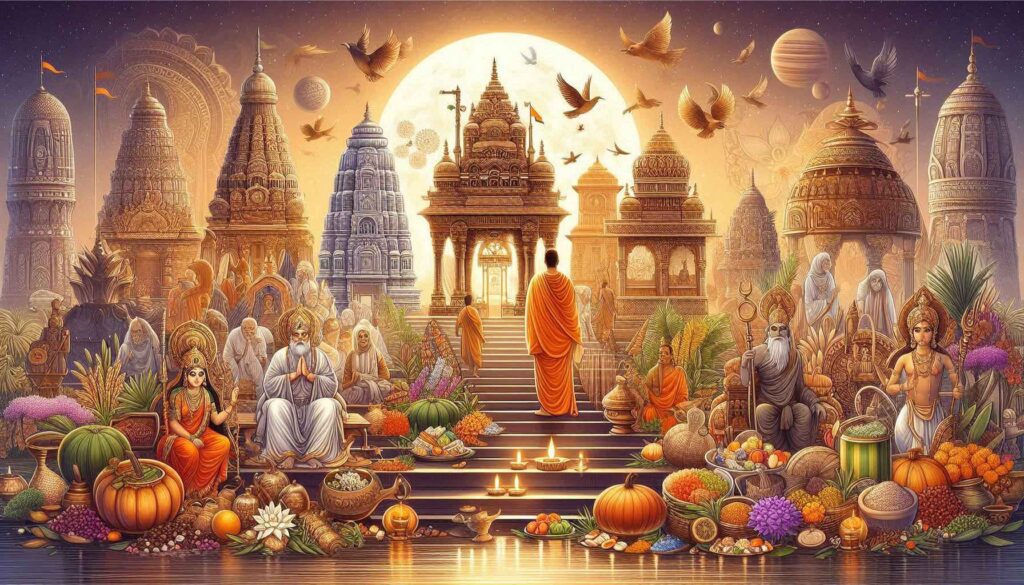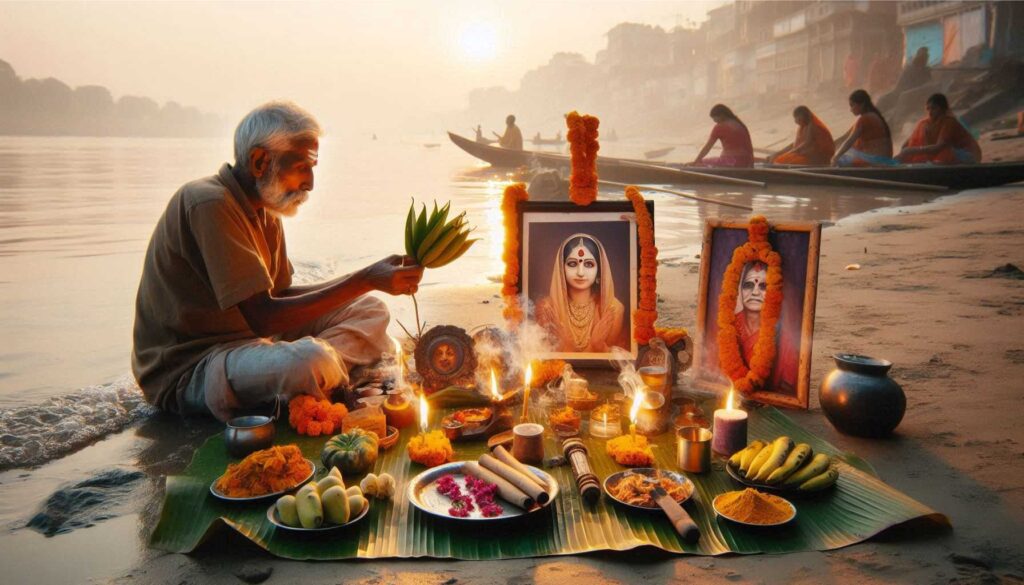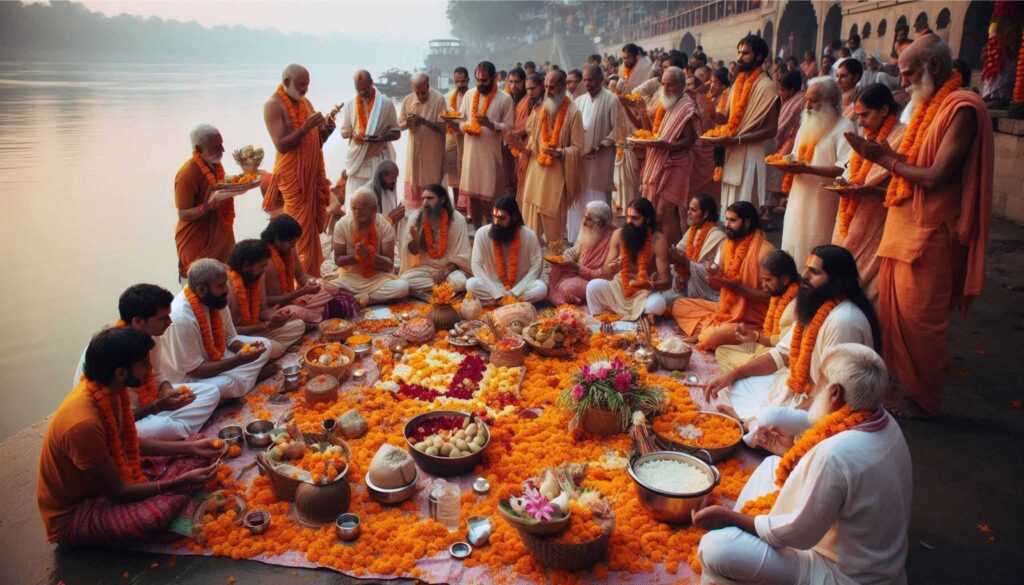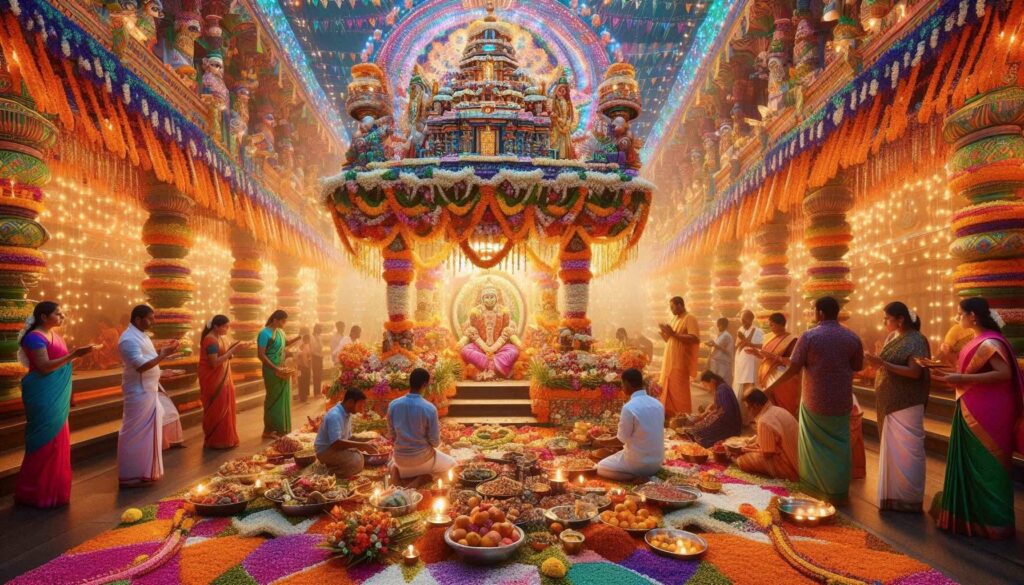Shradh in Different Indian States: Regional Variations and Customs

Hinduism’s diverse cultural landscape is deeply reflected in how Shradh rituals are observed across various Indian states. While the core purpose of Shradh remains consistent — to honor deceased ancestors — the customs, rituals, and practices can vary significantly based on regional traditions, beliefs, and local customs. From North India to South India, East to West, the observance of Shradh takes on a myriad of forms, each enriching the broader spiritual tapestry of Hinduism.
Read More About Hindu Philosophyhttps://hinduvism.com/category/rituals-practices/
The Significance of Shradh in Hinduism

Before delving into the regional customs, it’s essential to understand the core significance of Shradh. Shradh is a sacred ritual aimed at paying homage to deceased ancestors. It is believed that through these rituals, the souls of the ancestors are appeased, allowing them to attain peace and granting their blessings to the living family members. Shradh is typically observed during Pitru Paksha, a 16-day period in the Hindu lunar calendar, generally occurring in the month of Bhadrapada (September-October).
Shradh in North India

In North India, Shradh is widely observed, especially in states like Uttar Pradesh, Bihar, and Rajasthan. The rituals are mostly traditional, and the importance of Shradh is passed down through generations.
- Uttar Pradesh: Varanasi, one of the holiest cities in India, is considered an auspicious place to perform Shradh. Pilgrims from across the country visit the city during Pitru Paksha to offer Pind Daan and perform Tarpan by the banks of the sacred Ganges River. The belief is that offerings made in Varanasi ensure liberation for the ancestors’ souls.
- Bihar: In Bihar, the Gaya Shradh holds special significance. The city of Gaya is believed to be the gateway to salvation for ancestors, and it is considered a must-visit for Shradh rituals. According to the Vishnu Purana, performing Shradh in Gaya is more fruitful than at any other place, ensuring the ultimate liberation of ancestral souls. Pilgrims perform Pind Daan at the Vishnupad Temple.
- Rajasthan: In Rajasthan, Shradh is observed with simplicity and devotion. Special emphasis is laid on the Tarpan ritual, where water is offered to the ancestors. Many families also visit the sacred Pushkar Lake to perform Shradh, believing that the blessings of ancestors bring prosperity.
Shradh in South India

Shradh in South India, particularly in states like Tamil Nadu, Kerala, and Andhra Pradesh, has a unique set of rituals and traditions, often interwoven with the culture of the Dravidian South.
- Tamil Nadu: In Tamil Nadu, the Shradh ceremony is known as Tharpanam. The rituals are often performed near holy water bodies like the Cauvery River or at seashores. Families place particular importance on feeding Brahmins and offering food to the poor after the ritual, as it is believed to bring blessings from ancestors. Many people visit the city of Rameswaram, a sacred place to perform Shradh rites, as it is believed that performing Pind Daan here grants salvation.
- Kerala: In Kerala, Shradh is known as Bali Tharpanam. It is usually performed on the new moon day (Amavasya) during Karkidakam month, which coincides with Pitru Paksha. A key feature of Kerala Shradh rituals is offering food, particularly boiled rice balls, to crows, which are considered messengers of ancestors. The Varkala Temple in Kerala is a popular pilgrimage spot for performing these rituals.
- Andhra Pradesh and Telangana: In these states, Shradh ceremonies are often elaborate, involving rituals like Homa (fire offerings) and special Pind Daan offerings. The Godavari River is a prominent site for Shradh ceremonies, where devotees gather to offer Tarpanam to their ancestors. Brahmin priests are invited to the homes to perform the rituals, and it is common to donate clothes and food to the poor during the observance.
Shradh in East India
The eastern states of India have a rich cultural tradition tied to Shradh, with special significance given to religious locations and rituals that blend local practices with Vedic customs.
- West Bengal: Shradh in West Bengal is known as Pinda Puja. It is marked by grand offerings and rituals during the Mahalaya Amavasya (new moon day). Families offer special food items to Brahmins and the poor, as well as prepare offerings for crows, symbolizing ancestors. Many families also observe a unique tradition called Tarpan by the Ganges, where people gather at the riverbanks to offer prayers.
- Odisha: Shradh in Odisha is popularly known as Mahalaya Shradh and is an essential part of the Pitru Paksha observance. Families perform the rituals at sacred sites like Puri or on the banks of the Mahanadi River. Pind Daan is commonly offered to ancestors, followed by a Brahmin Bhoj where food is offered to Brahmins.
- Assam: In Assam, Shradh is known as Pitri Tarpan, and the rituals are closely aligned with those in Bengal. Families offer Pinda (rice balls) and conduct special prayers to honor their ancestors. Some people in Assam also perform Shradh by visiting pilgrimage sites like Hajo.
Shradh in West India
In western India, Shradh rituals are celebrated with a mix of local traditions and ancient Vedic practices, particularly in states like Gujarat and Maharashtra.
- Gujarat: Shradh in Gujarat is characterized by its deep connection to the ancestral offerings made during Pitru Paksha. People perform the Shradh rituals near sacred water bodies like the Narmada River or the Sabarmati River. Special Pind Daan and Tarpan ceremonies are performed with devotion, and it is customary to feed the Brahmins after the rituals.
- Maharashtra: In Maharashtra, Shradh is observed with great devotion, and special rituals like Pind Daan and Tarpan are performed near the Godavari River in Nashik or other sacred locations. The rituals are also performed on specific lunar days during Pitru Paksha. Maharashtrians believe that feeding the poor after Shradh rituals ensures prosperity in the family.
- Goa: In Goa, Shradh is referred to as Shraddha Karma. It is a family-oriented ritual performed in homes or near temples. The unique tradition in Goa includes offering modaks (a type of sweet) as a part of the ancestral offering. Many Goans observe this practice on the shores, offering Tarpan to ancestors in the nearby sea.
Shradh in the Himalayan Region
The Himalayan region, including the states of Uttarakhand and Himachal Pradesh, holds Shradh in high regard, with specific practices that involve the natural surroundings and pilgrimage sites.
- Uttarakhand: In Uttarakhand, Shradh is performed near the holy rivers, particularly the Ganga and Yamuna. The Brahma Kapal at Badrinath is a revered location for performing Shradh rituals, believed to grant liberation to ancestors. The ceremony here includes the traditional offering of Pind Daan and Tarpan.
- Himachal Pradesh: In Himachal Pradesh, Shradh is observed with local variations, often performed at home with rituals passed down through generations. Special offerings are made at local temples, and families prepare traditional dishes that were enjoyed by the deceased ancestors, offering these dishes in their memory.
Common Rituals in Shradh Across Regions
While Shradh rituals vary by state, some core elements remain universal across India:
- Pind Daan: The offering of rice balls (Pinds) made from flour, barley, and black sesame seeds.
- Tarpan: The offering of water mixed with sesame seeds and kusha grass to quench the thirst of the departed souls.
- Brahmin Bhoj: Serving food to Brahmins after the rituals is considered essential in almost every state.
- Offering to Crows: Crows are seen as messengers of ancestors, and offering food to them is an important practice across the country.
Cultural and Scriptural Importance of Shradh
According to the Garuda Purana, performing Shradh is one of the most important rituals for ensuring the peace of departed souls. The Garuda Purana states that those who perform Shradh during the Pitru Paksha ensure that their ancestors are content and can progress toward Moksha. This sentiment is echoed in the Mahabharata, where the Pandavas are instructed to perform Shradh rituals to seek blessings for their future endeavors.
The Vishnu Smriti emphasizes the importance of offering food and water during Shradh to repay the karmic debt one owes to their ancestors. The scriptures stress that a proper Shradh, performed with devotion, ensures that the ancestors’


